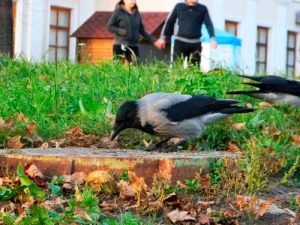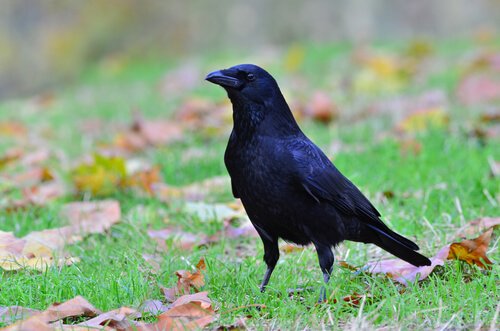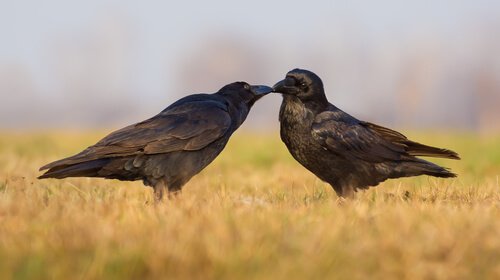Is It Totally Crazy to Have a Crow as a Pet?

Some people think of them as evil. Other people probably just see them as another animal. Then there are those people who make them their best friends. If you want to have a crow as a pet, but are worried it sounds totally crazy, don’t worry because having them as pets actually goes back centuries.
So, how do you even take care of this kind of bird? The answer is simpler than you might have expected. Their needs are just as easy to fulfill as a parrot or a cockatoo.
A strange animal
Crows are migratory birds that scavenge for their food. In other words, they eat other animal’s leftovers or prey. They’re also omnivorous, so they have no problem eating plants or other animals.
One important thing to remember about crows is that they’re very territorial. They won’t accept the presence of any other animal or crow that’s not part of their flock. The moment they notice an animal that doesn’t belong to their family, they’ll attack it.
In the wild, they mainly eat the eggs of small birds and all kinds of seeds. Since these aren’t things they always have access too, they’re also very skilled at hunting small animals.
Ultimately, crows are social animals with a much higher IQ than most others. They’re actually so intelligent that they can easily recognize human faces. So, if you know how to treat them and are respectful to them, they can become great pets.

Is it hard to have a crow as a pet?
If you try to tame a wild crow, you might be able to get them to recognize you and allow you to approach them, but that doesn’t mean you’ve fully succeeded. They will only tolerate you and let you get close to them because they look at you as a food source.
However, if you have a crow as a pet from the time it was just a chick, that changes everything. When an animal recognizes you as of childhood, they usually become affectionate with you. That means it will also put a lot of trust in you.
Due to their ability to differentiate human faces, crows can even recognize the different members of your family, especially anyone who feeds them every day.
Unlike other domestic birds, if you want to have a crow as a pet, you shouldn’t keep them in a cage too often. They can develop problems with their wings if they don’t use them enough. Remember, they can also grow to be up to 27-28 inches tall, with a wingspan that’s twice as long.
The benefits of having a crow as a pet
If you’ve succeeded in raising a pet crow, you will see some great advantages of having them over other birds. They’re hunters, so they can help keep insects out of your house.
Another interesting thing about crows is that they can repeat more words than parrots. Their learning capacity is actually so high that they can go beyond learning words and possibly even understand their meanings.

A lot of people think crows are violent, unfriendly animals. That can be true when they’re wild. However, domesticated crows are completely different. They’re actually very caring and affectionate with the members of their family. Some can even be playful, though this is a bit less common.
It’s not too difficult to keep them fed, either. You can give them other animals or several kinds of grain. There are plenty of satisfied crow owners who have fallen in love with what good pets they can make when raised with affection.
Negative aspects
But all these positives don’t come without a price. It might be hard to believe, but crows are very jealous. Both domestic and wild crows don’t put up well with other animals because they’re very territorial. So, if you have any other pets, be careful before you decide to raise a crow.
Crows are also very curious because of their intelligence, and this is one of the few places the myths about them are true. They love shiny objects, so they can have a tendency to take things that don’t belong to them and hide them.
No matter what, you can handle a pet like this. If you’re patient and consistent, a crow could be the best pet friend you’ve ever had.
Some people think of them as evil. Other people probably just see them as another animal. Then there are those people who make them their best friends. If you want to have a crow as a pet, but are worried it sounds totally crazy, don’t worry because having them as pets actually goes back centuries.
So, how do you even take care of this kind of bird? The answer is simpler than you might have expected. Their needs are just as easy to fulfill as a parrot or a cockatoo.
A strange animal
Crows are migratory birds that scavenge for their food. In other words, they eat other animal’s leftovers or prey. They’re also omnivorous, so they have no problem eating plants or other animals.
One important thing to remember about crows is that they’re very territorial. They won’t accept the presence of any other animal or crow that’s not part of their flock. The moment they notice an animal that doesn’t belong to their family, they’ll attack it.
In the wild, they mainly eat the eggs of small birds and all kinds of seeds. Since these aren’t things they always have access too, they’re also very skilled at hunting small animals.
Ultimately, crows are social animals with a much higher IQ than most others. They’re actually so intelligent that they can easily recognize human faces. So, if you know how to treat them and are respectful to them, they can become great pets.

Is it hard to have a crow as a pet?
If you try to tame a wild crow, you might be able to get them to recognize you and allow you to approach them, but that doesn’t mean you’ve fully succeeded. They will only tolerate you and let you get close to them because they look at you as a food source.
However, if you have a crow as a pet from the time it was just a chick, that changes everything. When an animal recognizes you as of childhood, they usually become affectionate with you. That means it will also put a lot of trust in you.
Due to their ability to differentiate human faces, crows can even recognize the different members of your family, especially anyone who feeds them every day.
Unlike other domestic birds, if you want to have a crow as a pet, you shouldn’t keep them in a cage too often. They can develop problems with their wings if they don’t use them enough. Remember, they can also grow to be up to 27-28 inches tall, with a wingspan that’s twice as long.
The benefits of having a crow as a pet
If you’ve succeeded in raising a pet crow, you will see some great advantages of having them over other birds. They’re hunters, so they can help keep insects out of your house.
Another interesting thing about crows is that they can repeat more words than parrots. Their learning capacity is actually so high that they can go beyond learning words and possibly even understand their meanings.

A lot of people think crows are violent, unfriendly animals. That can be true when they’re wild. However, domesticated crows are completely different. They’re actually very caring and affectionate with the members of their family. Some can even be playful, though this is a bit less common.
It’s not too difficult to keep them fed, either. You can give them other animals or several kinds of grain. There are plenty of satisfied crow owners who have fallen in love with what good pets they can make when raised with affection.
Negative aspects
But all these positives don’t come without a price. It might be hard to believe, but crows are very jealous. Both domestic and wild crows don’t put up well with other animals because they’re very territorial. So, if you have any other pets, be careful before you decide to raise a crow.
Crows are also very curious because of their intelligence, and this is one of the few places the myths about them are true. They love shiny objects, so they can have a tendency to take things that don’t belong to them and hide them.
No matter what, you can handle a pet like this. If you’re patient and consistent, a crow could be the best pet friend you’ve ever had.
All cited sources were thoroughly reviewed by our team to ensure their quality, reliability, currency, and validity. The bibliography of this article was considered reliable and of academic or scientific accuracy.
- Berg, R. (1999). Corvus corax (common raven). Animal Diversity Web. https://animaldiversity.org/accounts/Corvus_corax/
- Blum C. R., Fitch, W. T., Bugnyar, T. (2020). Rapid Learning and Long-Term Memory for Dangerous Humans in Ravens (Corvus corax). Frontiers in Psychology, 11, 581794. https://www.frontiersin.org/articles/10.3389/fpsyg.2020.581794/full
- Boucherie, P. H., Blum, C., Bugnyar, T. (2020). Effect of rearing style on the development of social behaviour in young ravens (Corvus corax). Ethology, 126(6), 595-609. https://onlinelibrary.wiley.com/doi/full/10.1111/eth.13010
- Cibulski, L., Wascher, C. A. F., Weiß, B. M., Kotrschal, K. (2014). Familiarity with the experimenter influences the performance of Common ravens (Corvus corax) and Carrion crows (Corvus corone corone) in cognitive tasks. Behavioural Processes, 103, 129-137. https://www.sciencedirect.com/science/article/pii/S0376635713002520
- El Confidencial. (2022, 5 de septiembre). Vanta: el cuervo que juega como un perro y arrasa en redes sociales. https://www.elconfidencial.com/alma-corazon-vida/2022-09-05/vanta-cuerva-mascota-viral-tiktok_3474842/
- Oliden, k. (2016, 19 de noviembre). Con un cuervo por mascota. El diario Vasco. https://www.diariovasco.com/alto-deba/arrasate/201611/19/cuervo-mascota-20161119003446-v.html
- Friedman, E. (2020). Chapter 42: Corvids. Hand‐Rearing Birds, Second Edition. https://onlinelibrary.wiley.com/doi/abs/10.1002/9781119167792.ch42
- Loretto, M. C., Schuster, R., Federspiel, I. G., Heinrich, B., Bugnyar, T. (2020). Contextual imitation in juvenile common ravens, Corvus corax. Animal Behaviour, 163, 127-134. https://www.researchgate.net/publication/340594340_Contextual_imitation_in_juvenile_common_ravens_Corvus_corax
- Luef, E. M., Maat, A. T., Pika, S. (2017). Vocal similarity in long-distance and short-distance vocalizations in raven pairs (Corvus corax) in captivity. Behavioural Processes, 142, 1-7. https://www.sciencedirect.com/science/article/abs/pii/S0376635717302255
- SEO BirdLife. (s. f.). Cuervo grande. Consultado el 9 de junio de 2023. https://seo.org/ave/cuervo/
- Taylor, A. H. (2014). Corvid cognition. Wiley Interdisciplinary Reviews. Cognitive Science, 5(3). https://www.researchgate.net/publication/260604102_Corvid_cognition
This text is provided for informational purposes only and does not replace consultation with a professional. If in doubt, consult your specialist.








